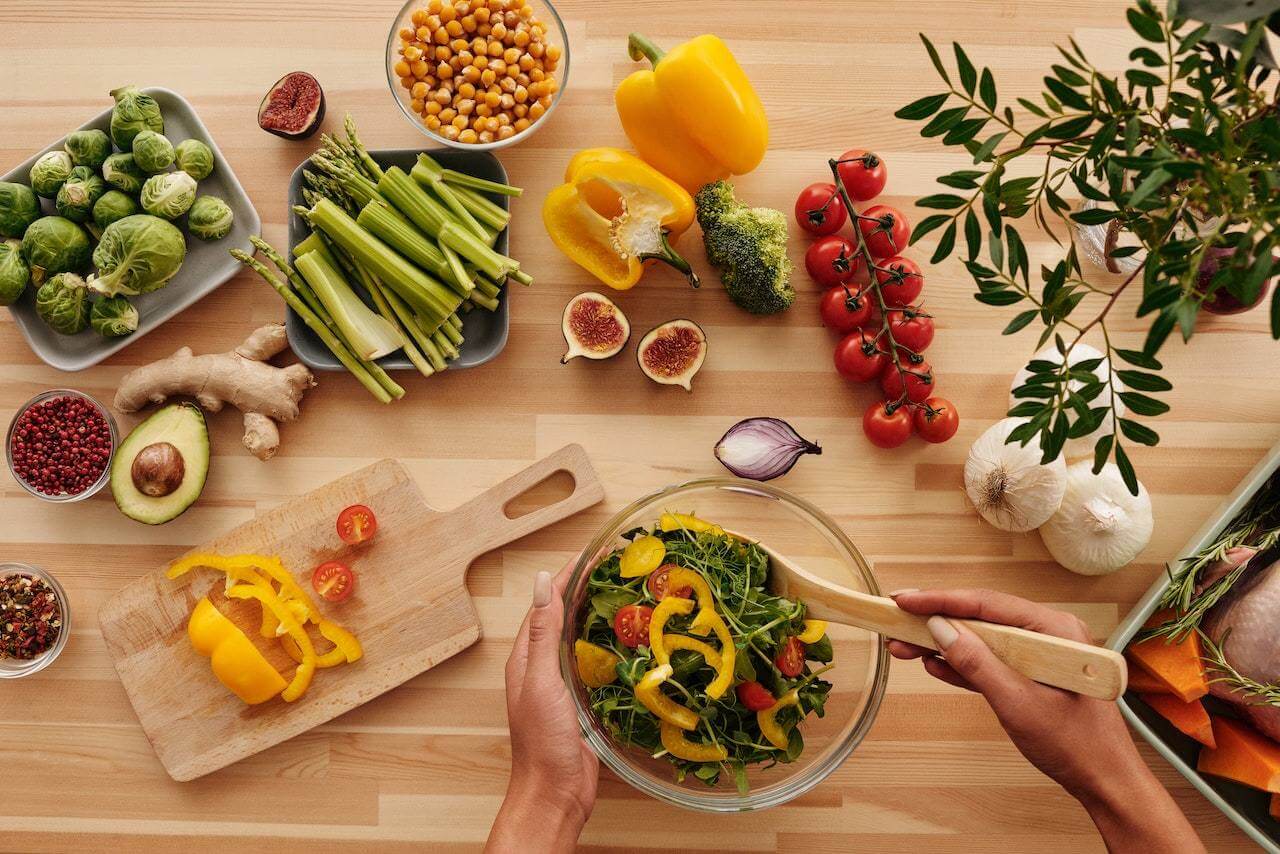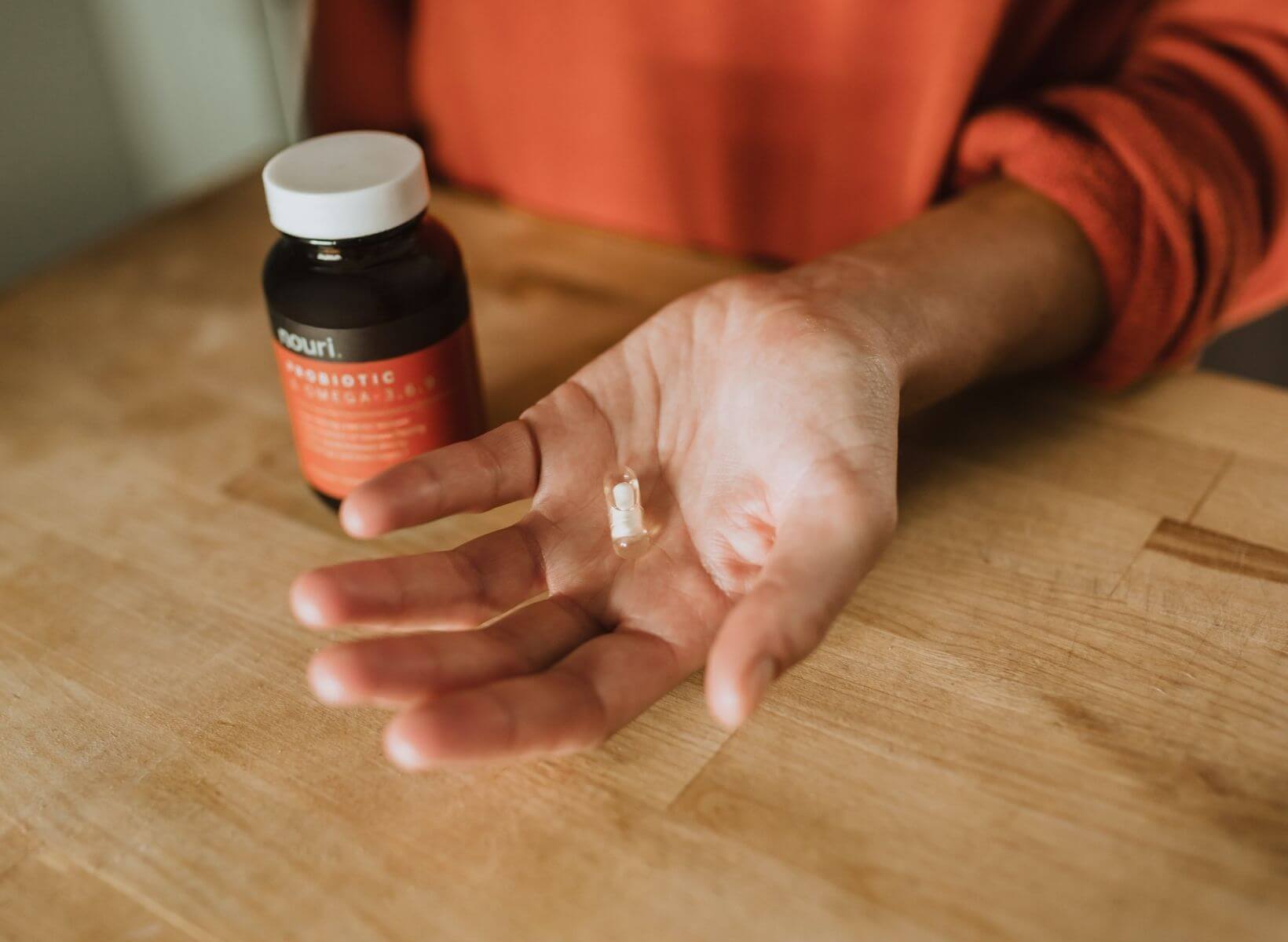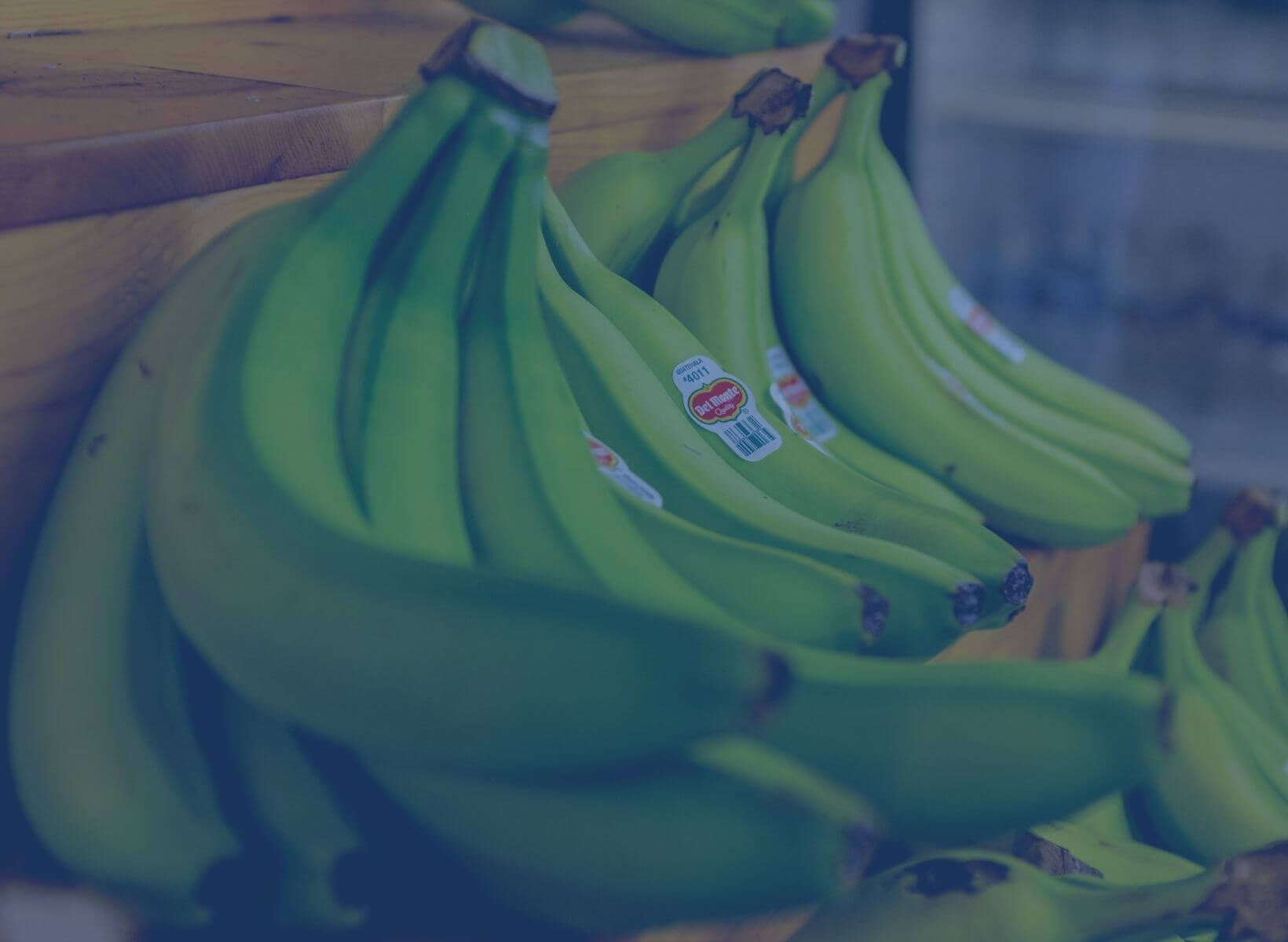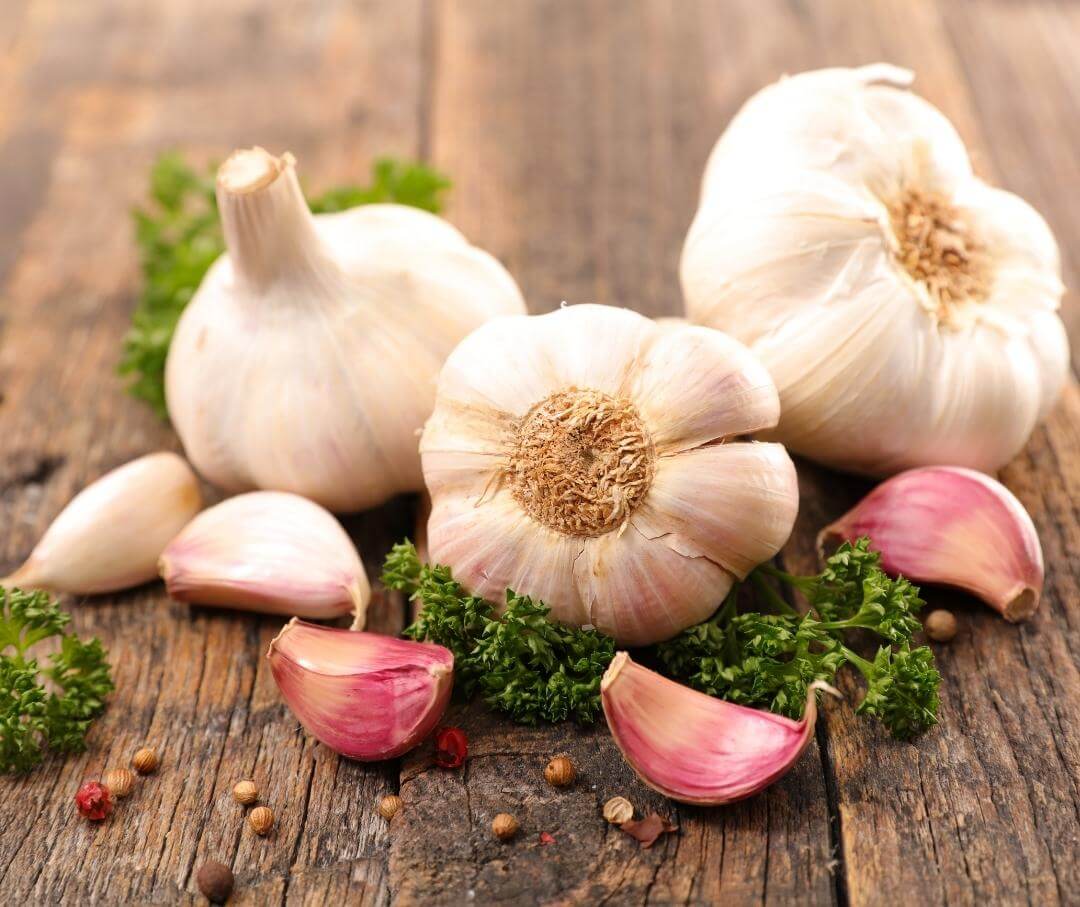Bloating is a common complaint among many people, and it usually comes alongside constipation, excess gas, hormone shifts, or conditions like irritable bowel syndrome (IBS).1
The foods you eat and drink have a significant effect on digestion and can even be a contributor to a bloated belly. While some foods are universally known to increase bloating, everyone is different, so what may cause bloating in one person may not affect another. This is why tracking your food and meal planning can help avoid or reduce bloating.
In this article, we will address what bloating is, what causes it, and some of our favorite foods to help beat the bloat.
What is bloating?
Bloating is when your belly feels full, tight, or distended because of excess air or gas.2 If you’ve ever been bloated, you know it can cause varying degrees of pain, from minor discomfort to intense pain.
Stomach bloating is commonly caused by digestive issues but may be caused by other factors. Possible causes of stomach bloating include:
Excess intestinal gas
While some gas is naturally produced during normal digestion, too much can indicate abnormal digestion. Excess gas may be from swallowing too much air when eating too quickly or drinking carbonated beverages. Usually, this air is released through burping.
Gas is formed in the large intestine when bacteria digest carbohydrates through fermentation. Eating too fast, food intolerances, and digestive diseases can disrupt the normal digestive process, causing an increase in fermentation and excess gas.
Hormonal changes
Hormonal changes during a woman’s menstrual cycle may cause bloating. Many women also report having bloating during perimenopause. Estrogen has also been shown to cause water retention. People may notice bloating from fluid shifting when estrogen levels increase, and progesterone decreases around menstruation. Additionally, the volume of the uterus increases during menstruation, which can cause bloating.3
Estrogen and progesterone also impact the gastrointestinal system. These hormones can each cause excess gas by altering the rate of gut motility.4
Digestive problems
Digestive problems like constipation, bowel obstructions, altered gut motility, Crohn’s disease, diverticulitis, and IBS have all been associated with increased abdominal bloating.5
Other medical causes
Persistent bloating accompanied by fever and vomiting may be due to a serious medical condition. You should seek treatment from a medical provider to rule out ascites (build-up of fluid in the abdomen due to liver, kidney, or heart failure), pancreatic insufficiency (pancreas no longer makes the digestive enzymes needed for digestion), gastritis or enteritis (inflammation of the stomach or intestines), or cancer.6
{{mid-cta}}
Understanding Why Some Foods May Help Relieve Bloating or Trigger It
Your digestive system works to break down the food you eat into energy that can be used to fuel your body’s cells, processes, and functions. However, certain foods are more difficult to digest than others, leaving excess gas in your gut.
Remnants of food that can't be broken down and digested by the intestines are transported to the colon, where bacteria ferment the undigested food, resulting in gas, burping, and flatulence.
Gas may also occur in people who lack certain digestive enzymes, such as those who lack the enzyme lactase needed to digest lactose.
Some nutrients from the foods you eat, like potassium, fiber, probiotics, inulin, and antioxidants, may help to relieve or prevent bloating.

What Foods and Drinks Help Ease Bloating?
Several foods and beverages may help decrease or prevent bloating. Here are 20 foods that can help ease bloating:
Yogurt
Yogurt is rich in probiotics, the good bacteria that support gut health. Studies suggest that probiotics improve digestive health and bowel regularity. Probiotics may also decrease bloating that is caused by irritable bowel syndrome (IBS).7,8
Avocados
Avocados are high in potassium, which helps regulate sodium levels and fluid balance to prevent water retention.9 They are also high in fiber, which helps promote digestive regularity and prevent constipation and bloating.10
Cucumber
Cucumbers have a high water content. Eating foods that are high in water can help you stay hydrated, which may reduce water retention and prevent bloating caused by dehydration.11,12,13
Bananas
Bananas are high in fiber and potassium, which may decrease bloating. Potassium helps decrease water retention, and fiber helps improve digestive health, which promotes regular bowel movements.9, 10
Ginger
Ginger is a well-known herb that relieves digestive discomfort. Some evidence suggests that ginger may speed up digestion and prevent feelings of bloating and excessive fullness. Ginger also has an enzyme called zingibain that helps the body break down protein more efficiently and promotes healthy digestion.14,15,16
Asparagus
Asparagus is high in fiber, a nutrient that supports digestive health and reduces bloating. It also contains inulin, a prebiotic fiber that may promote gut health and prevent bloating and constipation.17
Celery
Celery is another food that has a high water content. Celery also contains mannitol, a sugar alcohol that promotes regular bowel movements by pulling water into the colon and softening stools.18
In addition to these other nutritional benefits, celery has natural diuretic properties that help to increase urine production and rid the body of excess water and sodium, easing bloating.19
Berries
Berries are high in fiber, antioxidants, vitamins, and minerals. Eating more fiber can help improve gut health and prevent constipation which can help prevent bloating.10
Papaya
Not only is papaya high in fiber, but it also has a high water content. Papaya also contains an enzyme called papain which aids the body in digesting and breaking down protein into amino acids. This fruit's fiber and water content, along with the enzyme papain, may promote healthy digestion and ease bloating.20
Oats
Eating oatmeal every morning can be a great way to promote digestive health and fight bloating. Oats are high in fiber, particularly beta-glucan, a type of fiber that has anti-inflammatory properties.21
Green Tea
This herbal tea can help you stay hydrated and stave off bloating. Green tea is high in antioxidants that can decrease inflammation. The caffeine in great tea also has a natural laxative effect, stimulating bowel movements and lessening bloating.22
Kombucha
Kombucha is a fermented beverage that is high in probiotics and antioxidants. It is often made from green or black tea. Drinking kombucha can increase hydration, support a healthy gut, and fight inflammation, all of which can help ease bloating.23
Peppermint Tea
Peppermint tea is often used to treat digestive symptoms. It has been shown to reduce inflammation and ease IBS symptoms like bloating, stomach discomfort, and constipation. It might also inhibit muscle spasms in the digestive tract which might help calm bloating.24
Pineapple
Pineapple is high in vitamins, minerals, and antioxidants and contains over 80% water. Pineapple also contains an enzyme called bromelain, which has been used in traditional medicine to help alleviate symptoms of digestive disorders. Some studies show that bromelain may also fight inflammation, which can help with symptoms like bloating.25
Turmeric
Turmeric contains an antioxidant compound called curcumin, which may help support gut health and alleviate symptoms of IBS, including bloating.26,27
Quinoa
Quinoa is high in fiber and antioxidants, which may help decrease bloating. Quinoa is also gluten-free, which may benefit some people who experience bloating after eating gluten-containing foods like pasta, crackers, and bread.10,28
Apples
Apples are high in water, potassium, and fiber. These nutrients help regulate fluid balance, keep you hydrated, and promote regular bowel movements.9,10,12
Rhubarb
Rhubarb is high in fiber and contains a substance called sennoside. Sennosides, often found in stool softeners and laxatives, have a natural laxative effect that stimulates bowel movements.10,29
Kiwi
Kiwi contains several nutrients that can ease bloating, including fiber and potassium.9,10
More than one study indicates that kiwi may have digestive benefits that decrease bloating, stomach discomfort, and constipation.30,31,32
Fennel
Fennel is closely related to celery and shares its ability to increase urine production and decrease water retention. It also has antispasmodic properties that may help relax the muscles in your gut and ease symptoms of gas and bloating.31
Other Ways of Preventing Bloating
In addition to adding more bloat-fighting foods to your diet, there are other steps you can take to prevent bloating.
Taking Probiotics
Daily probiotics can help restore your gut bacteria and promote better digestion. Some probiotics will improve digestion; others may increase the absorption of excess gas. It may take several days or weeks of consistent use before you notice any changes.7,8
Chewing Slowly and Thoroughly
Chewing is the first part of the digestive process. It is important to eat slowly and chew your food thoroughly. Chewing thoroughly improves digestion and reduces excess gas that can cause bloating. Food not chewed completely takes longer to move through the digestive system, which can increase bloating.
Physical Activity
Regular exercise can help decrease excess gas and bloating. Studies show that being physically inactive may increase the risk of poor digestive health and aggravate gastrointestinal symptoms like bloating.35
High-quality Sleep
Getting enough sleep can help prevent bloating. Poor sleep quality can negatively impact various aspects of your health, including digestion. Lack of sleep can also alter hormone levels that affect gut health and digestion.37,38

Foods And Drinks That May Cause Bloating
Many foods and beverages may cause digestive issues like bloating. Here are six things you may want to avoid if you’re experiencing bloating:
Beans and lentils
Legumes contain FODMAPs (fermentable oligo-, di-, mono-saccharides, and polyols) which some people may have difficulty digesting. These short-chain carbohydrates escape digestion and are then fermented by gut bacteria in the colon. Gas and bloating are a common byproduct of this process.39
Carbonated drinks
These beverages are high in carbon dioxide, a gas that gets trapped in the stomach and causes pressure. This may lead to stomach discomfort and burping.40
Sugar alcohols
Sugar alcohols are also FODMAPs. These artificial sweeteners may cause digestive problems in some individuals. Consuming high amounts of sugar alcohols may cause digestive issues, such as bloating, gas, and diarrhea.41
Wheat
For people with celiac disease or gluten sensitivity, wheat causes serious digestive problems, including bloating, gas, diarrhea, and stomach pain. Wheat is also a source of FODMAPs, which may cause gas and bloating in some individuals.42
Dairy products
For those who are lactose intolerant, dairy may cause gas, bloating, stomach pain, and diarrhea.
Cruciferous vegetables
Broccoli, cauliflower, and other cruciferous vegetables contain FODMAPs and may be a source of digestive upset for some people. Cooking these vegetables makes them easier to digest and less likely to cause gas and bloating.
Making a De-Bloating Diet Part of Your Lifestyle
To make lifestyle changes that will help reduce bloating, you have to first understand the cause of your bloating. Tracking your food and symptoms can help determine how your diet triggers bloating.
If bloating is persistent, painful, or begins to worsen, you should seek treatment from a medical provider to rule out any serious health conditions.
Keep Track of Your Diet and Improve Your Health with Signos
Signos CGM empowers you to improve your health by keeping track of your diet, exercise, sleep habits, and blood sugar. Knowledge is power, and a CGM can give you specific information about how your habits affect your health.
Take a quick quiz to determine if Signos is a good fit for you.
- Item 1
- Item 2
- item 3
Topics discussed in this article:
References
- Mari A, Abu Backer F, Mahamid M, et al. Bloating and Abdominal Distension: Clinical Approach and Management. Adv Ther. 2019;36(5):1075-1084. doi:10.1007/s12325-019-00924-7
- Serra J. Management of bloating. Neurogastroenterol Motil. 2022;34(3):e14333. doi:10.1111/nmo.14333
- Bernstein MT, Graff LA, Avery L, Palatnick C, Parnerowski K, Targownik LE. Gastrointestinal symptoms before and during menses in healthy women. BMC Womens Health. 2014;14:14. Published 2014 Jan 22. doi:10.1186/1472-6874-14-14
- Eliakim R, Abulafia O, Sherer DM. Estrogen, progesterone and the gastrointestinal tract. J Reprod Med. 2000;45(10):781-788.
- Iovino P, Bucci C, Tremolaterra F, Santonicola A, Chiarioni G. Bloating and functional gastro-intestinal disorders: where are we and where are we going?. World J Gastroenterol. 2014;20(39):14407-14419. doi:10.3748/wjg.v20.i39.14407
- Hasler WL. Gas and Bloating. Gastroenterol Hepatol (N Y). 2006;2(9):654-662.
- Dimidi E, Christodoulides S, Fragkos KC, Scott SM, Whelan K. The effect of probiotics on functional constipation in adults: a systematic review and meta-analysis of randomized controlled trials. Am J Clin Nutr. 2014;100(4):1075-1084. doi:10.3945/ajcn.114.089151
- Hungin APS, Mitchell CR, Whorwell P, et al. Systematic review: probiotics in the management of lower gastrointestinal symptoms - an updated evidence-based international consensus. Aliment Pharmacol Ther. 2018;47(8):1054-1070. doi:10.1111/apt.14539
- Stone MS, Martyn L, Weaver CM. Potassium Intake, Bioavailability, Hypertension, and Glucose Control. Nutrients. 2016;8(7):444. Published 2016 Jul 22. doi:10.3390/nu8070444
- Abdullah MM, Gyles CL, Marinangeli CP, Carlberg JG, Jones PJ. Dietary fibre intakes and reduction in functional constipation rates among Canadian adults: a cost-of-illness analysis. Food Nutr Res. 2015;59:28646. Published 2015 Dec 11. doi:10.3402/fnr.v59.28646
- Fooddata Central Search Results. FoodData Central. https://fdc.nal.usda.gov/fdc-app.html#/food-details/1103352/nutrients. Published October 30, 2020. Accessed December 28, 2022.
- Hahn RG, Grankvist N, Krizhanovskii C. Urinary Analysis of Fluid Retention in the General Population: A Cross-Sectional Study. PLoS One. 2016;11(10):e0164152. Published 2016 Oct 20. doi:10.1371/journal.pone.0164152
- Armstrong LE, Johnson EC. Water Intake, Water Balance, and the Elusive Daily Water Requirement. Nutrients. 2018;10(12):1928. Published 2018 Dec 5. doi:10.3390/nu10121928
- Anh NH, Kim SJ, Long NP, et al. Ginger on Human Health: A Comprehensive Systematic Review of 109 Randomized Controlled Trials. Nutrients. 2020;12(1):157. Published 2020 Jan 6. doi:10.3390/nu12010157
- Nikkhah Bodagh M, Maleki I, Hekmatdoost A. Ginger in gastrointestinal disorders: A systematic review of clinical trials. Food Sci Nutr. 2018;7(1):96-108. Published 2018 Nov 5. doi:10.1002/fsn3.807
- Lete I, Allué J. The Effectiveness of Ginger in the Prevention of Nausea and Vomiting during Pregnancy and Chemotherapy. Integr Med Insights. 2016;11:11-17. Published 2016 Mar 31. doi:10.4137/IMI.S36273
- Bărboi OB, Ciortescu I, Chirilă I, Anton C, Drug V. Effect of inulin in the treatment of irritable bowel syndrome with constipation (Review). Exp Ther Med. 2020;20(6):185. doi:10.3892/etm.2020.9315
- Meena M, Prasad V, Zehra A, Gupta VK, Upadhyay RS. Mannitol metabolism during pathogenic fungal-host interactions under stressed conditions. Front Microbiol. 2015;6:1019. Published 2015 Sep 24. doi:10.3389/fmicb.2015.01019
- Kooti W, Daraei N. A Review of the Antioxidant Activity of Celery ( Apium graveolens L). J Evid Based Complementary Altern Med. 2017;22(4):1029-1034. doi:10.1177/2156587217717415
- Annaházi A, Schröder A, Schemann M. Region-specific effects of the cysteine protease papain on gastric motility. Neurogastroenterol Motil. 2021;33(7):e14105. doi:10.1111/nmo.14105
- Bashir KMI, Choi JS. Clinical and Physiological Perspectives of β-Glucans: The Past, Present, and Future. Int J Mol Sci. 2017;18(9):1906. Published 2017 Sep 5. doi:10.3390/ijms18091906
- Ohishi T, Goto S, Monira P, Isemura M, Nakamura Y. Anti-inflammatory Action of Green Tea. Antiinflamm Antiallergy Agents Med Chem. 2016;15(2):74-90. doi:10.2174/1871523015666160915154443
- Sanders ME, Merenstein DJ, Reid G, Gibson GR, Rastall RA. Probiotics and prebiotics in intestinal health and disease: from biology to the clinic [published correction appears in Nat Rev Gastroenterol Hepatol. 2019 Aug 9;:]. Nat Rev Gastroenterol Hepatol. 2019;16(10):605-616. doi:10.1038/s41575-019-0173-3
- Alammar N, Wang L, Saberi B, et al. The impact of peppermint oil on the irritable bowel syndrome: a meta-analysis of the pooled clinical data. BMC Complement Altern Med. 2019;19(1):21. Published 2019 Jan 17. doi:10.1186/s12906-018-2409-0
- Rathnavelu V, Alitheen NB, Sohila S, Kanagesan S, Ramesh R. Potential role of bromelain in clinical and therapeutic applications. Biomed Rep. 2016;5(3):283-288. doi:10.3892/br.2016.720
- Hewlings SJ, Kalman DS. Curcumin: A Review of Its Effects on Human Health. Foods. 2017;6(10):92. Published 2017 Oct 22. doi:10.3390/foods6100092
- Ng QX, Soh AYS, Loke W, Venkatanarayanan N, Lim DY, Yeo WS. A Meta-Analysis of the Clinical Use of Curcumin for Irritable Bowel Syndrome (IBS). J Clin Med. 2018;7(10):298. Published 2018 Sep 22. doi:10.3390/jcm7100298
- Tang Y, Tsao R. Phytochemicals in quinoa and amaranth grains and their antioxidant, anti-inflammatory, and potential health beneficial effects: a review. Mol Nutr Food Res. 2017;61(7):10.1002/mnfr.201600767. doi:10.1002/mnfr.201600767
- Kon R, Ikarashi N, Nagoya C, et al. Rheinanthrone, a metabolite of sennoside A, triggers macrophage activation to decrease aquaporin-3 expression in the colon, causing the laxative effect of rhubarb extract. J Ethnopharmacol. 2014;152(1):190-200. doi:10.1016/j.jep.2013.12.055
- Wallace A, Eady S, Drummond L, Hedderley D, Ansell J, Gearry R. A Pilot Randomized Cross-Over Trial to Examine the Effect of Kiwifruit on Satiety and Measures of Gastric Comfort in Healthy Adult Males. Nutrients. 2017;9(7):639. Published 2017 Jun 22. doi:10.3390/nu9070639
- Weir I, Shu Q, Wei N, Wei C, Zhu Y. Efficacy of actinidin-containing kiwifruit extract Zyactinase on constipation: a randomised double-blinded placebo-controlled clinical trial. Asia Pac J Clin Nutr. 2018;27(3):564-571. doi:10.6133/apjcn.122017.03
- Caballero N, Benslaiman B, Ansell J, Serra J. The effect of green kiwifruit on gas transit and tolerance in healthy humans. Neurogastroenterol Motil. 2020;32(9):e13874. doi:10.1111/nmo.13874
- Badgujar SB, Patel VV, Bandivdekar AH. Foeniculum vulgare Mill: a review of its botany, phytochemistry, pharmacology, contemporary application, and toxicology. Biomed Res Int. 2014;2014:842674. doi:10.1155/2014/842674
- Villoria A, Serra J, Azpiroz F, Malagelada JR. Physical activity and intestinal gas clearance in patients with bloating. Am J Gastroenterol. 2006;101(11):2552-2557. doi:10.1111/j.1572-0241.2006.00873.x
- Ohlsson B, Manjer J. Physical inactivity during leisure time and irregular meals are associated with functional gastrointestinal complaints in middle-aged and elder subjects. Scand J Gastroenterol. 2016;51(11):1299-1307. doi:10.1080/00365521.2016.1209786
- Khanijow V, Prakash P, Emsellem HA, Borum ML, Doman DB. Sleep Dysfunction and Gastrointestinal Diseases. Gastroenterol Hepatol (N Y). 2015;11(12):817-825.
- Mei Q, Diao L, Xu JM, Liu XC, Jin J. A protective effect of melatonin on intestinal permeability is induced by diclofenac via regulation of mitochondrial function in mice. Acta Pharmacol Sin. 2011;32(4):495-502. doi:10.1038/aps.2010.225
- Melatonin improves bowel symptoms in female patients with irritable bowel syndrome: a double-blind placebo-controlled study. Aliment Pharmacol Ther. 2005 Nov 15;22(10):927-34.
- Bellini M, Tonarelli S, Nagy AG, et al. Low FODMAP Diet: Evidence, Doubts, and Hopes. Nutrients. 2020;12(1):148. Published 2020 Jan 4. doi:10.3390/nu12010148
- Cuomo R, Sarnelli G, Savarese MF, Buyckx M. Carbonated beverages and gastrointestinal system: between myth and reality. Nutr Metab Cardiovasc Dis. 2009;19(10):683-689. doi:10.1016/j.numecd.2009.03.020
- Lenhart A, Chey WD. A Systematic Review of the Effects of Polyols on Gastrointestinal Health and Irritable Bowel Syndrome. Adv Nutr. 2017;8(4):587-596. Published 2017 Jul 14. doi:10.3945/an.117.015560
- Leonard MM, Sapone A, Catassi C, Fasano A. Celiac Disease and Nonceliac Gluten Sensitivity: A Review. JAMA. 2017;318(7):647-656. doi:10.1001/jama.2017.9730
































